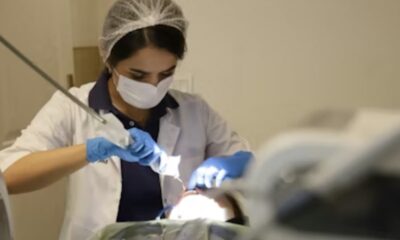Science
CDC Study Reveals Risk Factors for Birth Defects Among Women

A new study from the Centers for Disease Control and Prevention (CDC) highlights significant risk factors for birth defects among women under 50, emphasizing the need for preventive measures. The research indicates that one in 33 babies born in the United States has a birth defect, with approximately 66% of women aged 12 to 49 possessing at least one modifiable risk factor.
The study, published in the American Journal of Preventive Medicine, identifies five key risk factors: obesity, diabetes, exposure to smoking, food insecurity, and low levels of folate, an essential vitamin for cell production. Alarmingly, around 10% of women surveyed reported having three or more of these risk factors.
According to the findings, which are based on responses from 5,374 women in the CDC’s National Health and Nutrition Examination Survey conducted from 2007 to 2020, public health officials can implement strategies to help mitigate these risks. Arick Wang, a health scientist at the CDC and the study’s lead author, stressed the importance of raising awareness and encouraging women to consult with their healthcare providers before pregnancy.
“We can’t underscore enough how important it is to raise awareness about these risk factors,” Wang stated. She highlighted that risks can be reduced through recommendations such as taking the suggested daily intake of 400 micrograms (mcg) of folic acid, maintaining a healthy diet, exercising regularly, and managing blood sugar levels.
Birth defects remain the leading cause of infant mortality, according to CDC data. Risk factors often begin before some women are even aware they are pregnant. While the exact causes of birth defects are still largely unknown, it is generally accepted that a combination of genetics, environmental influences, and lifestyle choices contribute to their occurrence.
Dr. Michael Warren, chief medical and health officer at March of Dimes, emphasized the urgency of addressing these issues. “This should be a wake-up call to all of us,” he said. Warren pointed out the necessity of ensuring that individuals have access to nutritious foods and safe environments for physical activity.
Food insecurity can lead to nutrient deficiencies critical for fetal development, including folate. Low folate concentrations are linked to neural tube defects, which affect the brain and spine and develop within the first month of pregnancy. Since 1998, the Food and Drug Administration (FDA) has mandated the fortification of enriched cereal-grain products with folic acid, which Wang noted likely prevents over 1,300 babies annually from being born with neural tube defects.
Despite these measures, many birth defects occur without identifiable causes. “Even when women do everything right—such as not smoking, abstaining from alcohol, monitoring caffeine intake, and exercising—they can still face unexpected outcomes,” said Wendy Nembhard, director of the Arkansas Center for Birth Defects Research and Prevention.
Obesity, affecting roughly one-third of the women surveyed, is the most prevalent modifiable risk factor identified in the CDC study. While the exact relationship between obesity and birth defects is not fully understood, there are indications that metabolic changes related to insulin and glucose management might play a role in abnormal fetal development.
High blood sugar levels associated with diabetes can also hinder organ development in the fetus. Furthermore, harmful chemicals found in cigarette smoke, including nicotine, can diminish oxygen supply to the developing baby.
In light of these findings, Warren noted that further action is necessary. He specifically referred to Mississippi, which recently declared a public health emergency due to high infant mortality rates and committed to addressing “care deserts,” areas lacking access to obstetric services.
The release of this critical study comes at a time when the CDC faces significant challenges, including proposed funding cuts and staff reductions. In March 2023, the Department of Health and Human Services announced the termination of 2,400 CDC employees. However, a federal judge issued a preliminary ruling blocking layoffs for specific programs, including the National Center on Birth Defects and Developmental Disabilities.
The continuation of this vital research is essential for advancing public health initiatives aimed at improving maternal and infant health, ensuring that women receive the necessary support and resources to reduce the risk of birth defects.
-

 Technology5 months ago
Technology5 months agoDiscover the Top 10 Calorie Counting Apps of 2025
-

 Health2 months ago
Health2 months agoBella Hadid Shares Health Update After Treatment for Lyme Disease
-

 Health3 months ago
Health3 months agoErin Bates Shares Recovery Update Following Sepsis Complications
-

 Technology4 months ago
Technology4 months agoDiscover How to Reverse Image Search Using ChatGPT Effortlessly
-

 Technology1 month ago
Technology1 month agoDiscover 2025’s Top GPUs for Exceptional 4K Gaming Performance
-

 Technology2 months ago
Technology2 months agoElectric Moto Influencer Surronster Arrested in Tijuana
-

 Technology5 months ago
Technology5 months agoMeta Initiates $60B AI Data Center Expansion, Starting in Ohio
-

 Technology5 months ago
Technology5 months agoRecovering a Suspended TikTok Account: A Step-by-Step Guide
-

 Health4 months ago
Health4 months agoTested: Rab Firewall Mountain Jacket Survives Harsh Conditions
-

 Lifestyle5 months ago
Lifestyle5 months agoBelton Family Reunites After Daughter Survives Hill Country Floods
-

 Technology4 months ago
Technology4 months agoHarmonic Launches AI Chatbot App to Transform Mathematical Reasoning
-

 Technology3 months ago
Technology3 months agoUncovering the Top Five Most Challenging Motorcycles to Ride



















